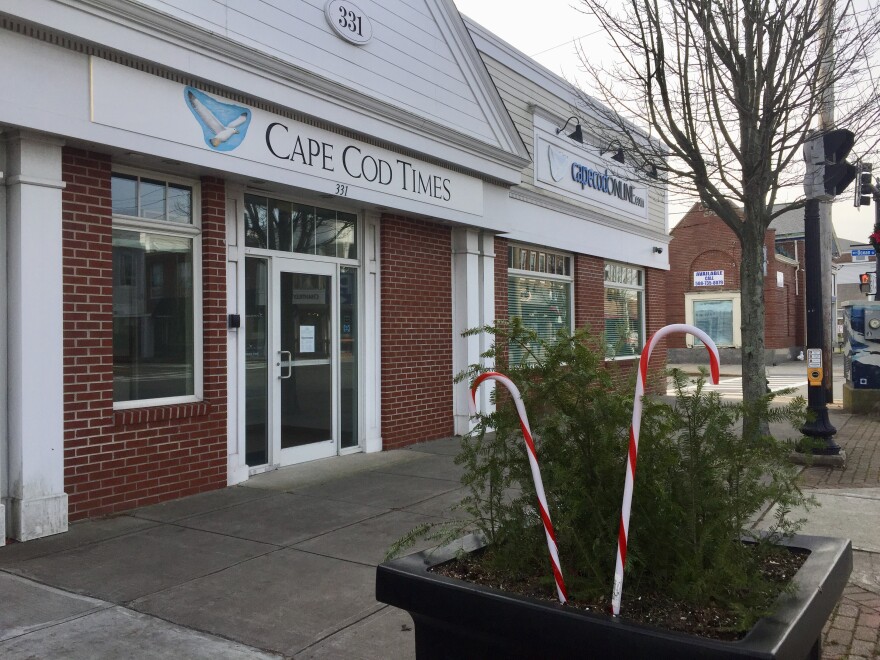After 185 years, the Mid-Cape newspaper The Register — as we knew it — is no more. The weekly founded in Yarmouth stopped printing on paper in December and went all-digital.
It’s not alone. Over the last year, several other weeklies on Cape Cod and the South Coast have gone digital or closed entirely.
In some cases, the change followed a period of declining local content.
The Nov. 25 edition of The Register had three Page 1 stories, all of them regional news from the Cape Cod Times, which is owned by the same company — and which is why, when The Register stopped printing, some readers said the paper they loved was already gone.
“When they took away The Register, what they did is they took away the heart of persons wanting to know what's going on in the area that you lived,” said a longtime Register reader, Charlie Adams of Yarmouth.
Before he retired last year in his mid 80s, Adams used to spend long workdays at an insurance agency he owned off-Cape. So he’d get a flavor of his hometown from the paper. But over time, the local content started to disappear.
“The paper was becoming less and less part of the average life of this community,” he said.
It wasn’t always this way. Seth Rolbein, a reporter at The Register in the 1970s who later returned as editor, says in its better days, the paper aimed to meet high journalistic standards.

“This generation … really was emerging out of Watergate and out of Woodward and Bernstein,” he said. “And, you know, some of us sort of fashioned ourselves to be kind of the Woodward and Bernstein in flip-flops … and sort of having sand on our toes and aspiring to that type of ambitious, long-form reporting.”
Weeks after The Register went out of print, copies of the paper were still sitting on the newsstand at Ocean Street Market in Hyannis, where market owner Harkalas Kandangwa said the only people who buy the newspaper are older.
“I think the young generation … they read [the] newspaper in their cell phone, or like the [tablet] or whatever,” he said.
That’s true: More people of all ages get their news digitally, all the time.
And that doesn’t have to be a bad thing, said Dan Kennedy, a journalism professor at Northeastern University and a GBH News contributor.
“I'm all in favor of dumping the costs of print and replacing it with online if you're going to make a commitment to covering local news,” he said.
But he said The Register’s national owner, Gannett, isn’t putting enough resources into its local papers. The company owns hundreds of local media outlets in 46 states.
“I don't see much of a commitment on Gannett's part,” he said. “The commitment mainly seems to be to cut as much as possible, save costs, pay down the debt, and really not provide communities with the news and information that they need.”
Gannett closed the Bourne Courier and Sandwich Broadsider last summer. In December, the company went all-digital with a South Coast weekly that covered Marion, Mattapoisett, Rochester and Wareham.
And last month, Gannett announced it’s ending the Saturday print edition of many of its dailies, including the Cape Cod Times, The Standard-Times, and The Herald News.

CAI contacted Gannett editors and corporate staff, who did not comment for this story.
Still, Kennedy isn’t all doom and gloom about the future of news.
“We're doing well at the national level now,” he said. “The Washington Post, The New York Times, NPR — there are all kinds of nationally based news organizations [that] are doing well.”
Some large regional news organizations, including The Boston Globe, are doing “pretty well,” he said. The biggest problem he sees is at the local community level. “It is being solved one community at a time,” he said.
In the greater Cape Cod region, locally owned community newspapers include The Enterprise papers of Bourne, Falmouth, Mashpee and Sandwich; The Cape Cod Chronicle; and the Martha’s Vineyard and Nantucket papers.
And we have more recent entries: The Provincetown Independent and the nonprofit New Bedford Light.
Dan Hamilton, once a managing editor at The Register, said he, too, has hope for local, independent newsrooms.
“And if you contrast that with … corporate ownership, I can remember being hassled by someone in the business office because I was using too many pens,” he said. “And they locked them up in the supply closet, and you had to go ask permission to get another pen.”
Supporters of independent media say it’s time to unlock the pens.





